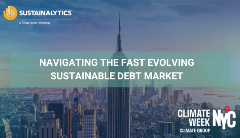SFDR and EU Taxonomy Product Disclosure Rules Finally Released
The publication of these rules marks the end of a prolonged period of uncertainty in the market around final rules and timelines - assuming the RTS will be adopted as-is in a Delegated Act, which turns these rules into regulation. There are several noteworthy aspects to these rules, which we address from our perspective in this article.
Biodiversity: A Crisis Equaling, Possibly Exceeding, Climate Change
According to the UN’s Convention on Biological Diversity the main drivers of biodiversity loss are habitat loss and degradation, climate change, pollution, over-exploitation, and invasive species. Habitat loss is directly linked to the conversion of natural ecosystems to agricultural lands and unsustainable use of water resources.
What’s Happening in Sustainable Finance: The Nuance of ESG Ratings, the Impact of Climate Change on Sport, and “Code Red” for Humanity
Discussing diverse sustainability and green finance topics including the momentum behind sustainability-linked bonds, the latest IPCC report as well as recent sustainable finance deals and transactions.
Bringing Investors and Companies Together to Accelerate Human Rights Progress
Human rights issues have been rising on the responsible investment agenda in recent years. The COVID-19 pandemic and the Black Lives Matter movement have provoked even more pointed discourse on the topic. The European Union’s current efforts to introduce rules to hold companies accountable for social and environmental risks in their supply chains further accelerate that ascent. This wave of legal requirements and normative expectations is impacting financial markets worldwide, with responsible business regulations already in place or quickly becoming valid.
Climate Week NYC: Navigating the Fast Evolving Sustainable Debt Market
While global green bond issuance has been growing rapidly, these instruments still represent a niche segment of the global bond market. Join Sustainalytics during Climate Week NYC for a virtual event on Navigating the Fast-Evolving Sustainable Debt Market.
Know Where You Stand With Corporate ESG Benchmarking
In this post we discuss why companies should generate a corporate ESG benchmark against their peers, explain how they can go about this exercise, and highlight how they can use that information to advance and enhance their own corporate ESG initiatives.
Impact of Climate Change and Extreme Weather on Essential Services
Utilities have found themselves in the literal and metaphorical eye of the storm over the last year as hurricanes, floods and wildfires of increasing frequency and strength have wreaked damage on their assets. In late August, Storm Ida made landfall in Louisiana, USA and devastated the power grid lines. Entergy, the utility operating in Louisiana, supplying most of New Orleans, restored 90% of the supply only by mid-September, with 87,000 customers still without power.
What’s Happening in Sustainable Finance: Key EU Developments and the Untapped Market of Climate-Aligned Bonds
Covering summer developments in the global sustainable finance market, including the launch of the EU’s renewed sustainable finance strategy, the publication of the Social Loan Principles and the EU Green Bond Standard, and the continuing growth in the sustainable bond and loan markets.
The circular way forward could be the key to reducing food waste
Indications that a food crisis is imminent are clear. Fundamental changes in the global food system are required to address these challenges. This decade is a watershed moment for urgent efforts to close the loop, and companies and investors can play a pivotal role. Despite being closely connected to issues such as climate change and basic human rights, food waste has attracted comparatively less attention from companies, investors, and other stakeholders.
Human Rights Accelerator
This thematic engagement aims to improve the adoption of globally agreed corporate standards for managing and promoting human rights, as defined by the UN Guiding Principles on Business and Human Rights (UNGPs) and mirrored in the OECD Guidelines for Multinational Enterprises.


















